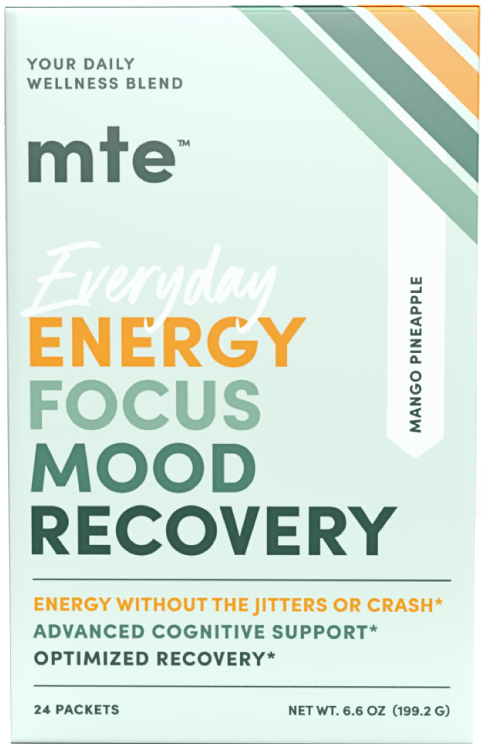
The Best (& Worst) Ingredients to Find in a Wellness Drink Powder
There are many reasons why knowing what’s in your food is important, such as allergies, religious principles, animal ethics, environmental concerns. That’s all before we even get to the “Is it healthy?” of it all.
The wellness supplement market is crowded with products all using the same 4 or 5 buzzwords to tell you why their productivity supplement is the best or how nootropics vs stimulants are better for energy boosts.
But what’s really inside that mood enhancer blend? How do you know if your daily wellness drink powder is actually healing your health or just covering your concerns?
We believe that what’s not in a holistic energy drink is just as important as what is, which is why MTE has only 10 ingredients. All our research has led us to some key insights on what’s possible in the world of healthy alternatives to caffeinated energy drinks, making it simple for you to suss out the real players the moment you scan an ingredients label:
Yes to: Nootropics for Energy
No to: Excessive Caffeine
Psst… we’re living in a post-caffeine world – pass it on. Contrary to popular belief, caffeine is no longer a requirement to achieve that energy boost you look for in the morning, before a workout, after lunch, etc. In fact, the pitfalls of excessive caffeine are counterintuitive to why you consume it in the first place.
Caffeinated energy drinks still dominate the market, but they’re quickly being replaced by caffeine-free alternatives that use nootropics vs stimulants, which creates a jitter-free energy along with nootropic benefits like increased focus and productivity.
Where caffeine ups stress, messes with your gut and hurts your sleep, nootropics like theanine, eleuthero, and paraxanthine support cognition, metabolism, sleep, and energy, all without the peak and crash of the caffeine roller coaster.
Yes to: Adaptogen Stacks & Prebiotic Support
No to: B-Vitamin & Creatine Bombs
Most of the big names in mainstream energy support their caffeine bombs with mega-doses of B vitamins and creatine. While both of these things are good in moderation, they’re not great at twice the recommended daily value.
In fact, the leading energy drink brands often exceed daily values of B2, B6 and B12 by nearly double. This can cause jitters, anxiety, heart palpitations, gut issues, irritability, and more. Or consider creatine, which is a staple in many mainstream workout supplements. Overconsuming creatine can cause gut issues, and over time can lead to kidney strain.
Adaptogen energy drinks with ashwagandha and chicory root, on the other hand, promote improved performance by helping the body adapt to stress while also supporting gut health. Your gut is your second brain, so it affects everything else – metabolism, mood, muscle health, etc.
The effect of streamlined digestion coupled with increased stress resilience keeps your body running efficiently, contributing to better performance, better mood and better immunity. It promotes clarity, reducing brain fog and optimizing your best efforts.
Yes to: Natural No-Cal Sugar Alternatives
No to: Added Sugars & Artificial Sweeteners
You’d be surprised how many foods – energy supplements definitely included – have added sugars, sugar alcohols or artificial sweeteners stuffed in there. Seriously, you can’t buy beef jerky without encountering added sugars and sweeteners.
Sugar bombs are going to make you feel spazzed then exhausted within the span of an hour, right along with the blood sugar spike it creates. Sugar alcohols and artificial sweeteners are all linked to questionable symptoms, including digestive upset to cancer risk. The reason mainstream “healthy” energy drinks include them is because they’re a cheap, no-calorie way to sweeten a food.
However, the best daily wellness drink powders will use high-quality, natural sugar alternatives like stevia leaf or monk fruit. Natural sugar alternatives aren’t as cheap or easy to source as other options, so it’s a good sign a brand is actually committed to the concept of healthy alternatives to sugary energy drinks.
Yes to: Natural Flavors & Colors
No to: Artificial Flavors & Dyes
There are no and have never been legitimate reasons for any consumable product to contain artificial colors and dyes. Does that productivity supplement really need to be glow-in-the-dark yellow? No. Would we all continue to live if energy drinks didn’t dye our tongues blue? Yes.
The minute you see names and numbers describing colors and flavors, you can bet that “daily wellness drink powder” isn’t that concerned with your wellness. Between dyes made of smushed beetles and flavors created from beaver anal glands and petrochemicals, you don’t want to guess where those artificial flavors and colors came from.
Like sweeteners, the way a healthy productivity drink makes their product look and taste tells you a lot about their commitment to that holistic claim.
Look for quality ingredients like turmeric, beet root, chicory, carrots, and spirulina (also a superfood!) near the end of the ingredients list. It indicates they were used in very small amounts – likely natural flavor and color. The word “extract” is usually a good sign, too.
Yes to: Science-Backed Formulations
No to: Big Claims But No Receipts
This is a big one. Anyone who has a lick of social media knows that every day comes with a new health trend claiming a product is Transformative! Revolutionary! Groundbreaking! It’s the post-modern snake oil salesman; next-gen 2 AM infomercials. And many of the claims are about as legitimate as Dr. Oz’s career trajectory.
Any wellness supplement that promises something – mood boosting drinks, energy supplements for concentration, nootropic alternatives to caffeine – should have evidence to back up their claims. If you can’t turn in a high school term paper without citing sources, you probably shouldn’t be able to sell a product without real research behind it. But you can. And here we are.
The best energy drink replacements will make a point of presenting the evidence that backs the function of their product. This might be resources like laboratory research on specific ingredients, studies of product performance, third-party product testing, and reviews from verified users.
Don’t take the company’s word for it – they’re trying to sell you something. It’s worth doing a bit of your own research if you’re looking to add a daily supplement to your wellness routine.
We love National Institute of Health’s PubMed research database. It’s open access and you can find studies on everything nutrition-related, like ashwagandha energy drinks, paraxanthine vs caffeine trials, best nootropics for mood – everything. It’s all too easy to fall into a rabbit hole here, believe us.
Bonus Tips for Decoding Nutritional Labels
Reading a food label shouldn’t be intimidating, but huge lists of ingredients can make it seem impossible to be educated on everything you’re eating without every grocery trip taking 5 hours to complete. But there are a few parts of the label a quick look can clue you in as to how processed it is and if it’s actually as healthy as it claims.
- If there is a high fat percentage and/or most of the fats are trans or saturated, it’s likely to be a more processed, less healthy food.
- Ingredients are listed by weight, so if sugars, fats, etc. are near the beginning of the ingredients list, it’s likely not a healthy choice.
- Foods with higher fiber content are likely to be less processed, plus they support digestion, blood sugar regulation and metabolism.
- If total sugar content is high and/or includes added sugars, it’s likely not a healthy choice. Consider that total sugar intake for an entire day should be 25-35g when looking at the sugar content of a certain food.
- Caffeinated energy drinks are required to list caffeine content per serving. It should be near the nutritional label, usually along its side or under the ingredients list. Pay attention to this number as it can be deceiving. For instance, if an energy drink has 200mg per serving and there are 2 servings in a can, you’ve already maxed out at “safe” doses of caffeine for the day.
TL;DR: The shorter an ingredients list is, the better. There are very few things in life that require ingredients you can’t pronounce. Though, it’s also worth looking up those crazy words, as every once in a while they’re actually a healthy wellness drink powder ingredient! (Looking at you, paraxanthine.)
In all things – knowledge is power! Knowing what’s in your food keeps you in control of your health in any setting.
MTE is a daily wellness blend specifically formulated to replace that morning handful of supplement pills with a refreshing caffeine-free energy drink that supports holistic health. It’s a powerful wellness blend you can actually feel, made of only good stuff, with good science behind it.



